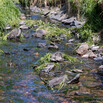The Role of Scientific Evidence in the Courtroom
On November 3, 2016, the Solomon Center for Health Law and Policy at Yale Law School, the Yale Health Law and Policy Society, and the Collaboration on Research Integrity & Transparency held a discussion on the use of scientific evidence in the courtroom. The panel was moderated by Dan Kahan, the Elizabeth K. Dollard Professor of Law and Professor of Psychology at Yale Law School, and featured U.S. District Court Judge Jed Rakoff and Senior Staff Attorney at the Innocence Project, Nina Morrison.
The panel discussed the intersections between science and the law, examining its often problematic use historically and its relevance today. In particular, the panelists highlighted how many types of forensic evidence commonly used in courtrooms are not founded on rigorous testing and can be used in problematic ways in criminal proceedings. The panelists cautioned that even proven forensic science, such as DNA, has its limits when testing samples in the real world and advocated a rigorous evaluation of forensic evidence when used to prove guilt.


